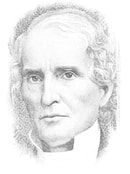albert barnes
Albert Barnes (December 1, 1798 – December 24, 1870) was an American theologian,
clergyman, abolitionist, temperance advocate, and author. Barnes is best known for his extensive Bible commentary and notes on the Old and New Testaments, published in a total of 14 volumes in the 1830s. Barnes was born in Rome, New York. He graduated from Hamilton College in Clinton, New York in 1820, and from Princeton Theological Seminary in 1823. Barnes was ordained as a Presbyterian minister by the presbytery of Elizabethtown, New Jersey, in 1825, and was the pastor successively of the Presbyterian Church in Morristown, New Jersey (1825–1830) and of the First Presbyterian Church of Philadelphia (1830–1868). Of the well-known New Testament Notes, it is said that more than a million volumes had been issued by 1870. The Notes on Job, the Psalms, Isaiah and Daniel found scarcely less acceptance. Displaying no original critical power, their chief merit lies in the fact that they bring in a popular (but not always accurate) form the results of the criticism of others within the reach of general readers. Barnes was the author of several other works of a practical and devotional kind, including Scriptural Views of Slavery (1846) and The Way of Salvation (1863). A collection of his Theological Works was published in Philadelphia in 1875.
clergyman, abolitionist, temperance advocate, and author. Barnes is best known for his extensive Bible commentary and notes on the Old and New Testaments, published in a total of 14 volumes in the 1830s. Barnes was born in Rome, New York. He graduated from Hamilton College in Clinton, New York in 1820, and from Princeton Theological Seminary in 1823. Barnes was ordained as a Presbyterian minister by the presbytery of Elizabethtown, New Jersey, in 1825, and was the pastor successively of the Presbyterian Church in Morristown, New Jersey (1825–1830) and of the First Presbyterian Church of Philadelphia (1830–1868). Of the well-known New Testament Notes, it is said that more than a million volumes had been issued by 1870. The Notes on Job, the Psalms, Isaiah and Daniel found scarcely less acceptance. Displaying no original critical power, their chief merit lies in the fact that they bring in a popular (but not always accurate) form the results of the criticism of others within the reach of general readers. Barnes was the author of several other works of a practical and devotional kind, including Scriptural Views of Slavery (1846) and The Way of Salvation (1863). A collection of his Theological Works was published in Philadelphia in 1875.
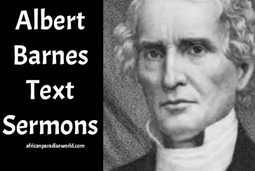
Aug 5, 2023:
Albert Barnes, a renowned 19th-century American theologian and Bible commentator, left an enduring legacy with his rich collection of text sermons. His dedication to the study and interpretation of the Bible, along with his profound insights into its teachings, made his sermons a source of inspiration and spiritual growth for generations of believers. In this post, we will explore the significance and impact of Albert Barnes’ text sermons, delving into the reasons why they continue to hold relevance and importance in the contemporary world.
--African Paradise World: The Significance and Impact of Albert Barnes’ Text Sermons
Albert Barnes, a renowned 19th-century American theologian and Bible commentator, left an enduring legacy with his rich collection of text sermons. His dedication to the study and interpretation of the Bible, along with his profound insights into its teachings, made his sermons a source of inspiration and spiritual growth for generations of believers. In this post, we will explore the significance and impact of Albert Barnes’ text sermons, delving into the reasons why they continue to hold relevance and importance in the contemporary world.
--African Paradise World: The Significance and Impact of Albert Barnes’ Text Sermons
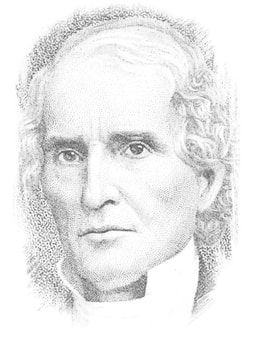 Albert Barnes
Albert Barnes
Even "her" strong incredulity was overcome, and though everything seemed to render what was announced impossible, and though she was so much disposed to laugh at the very suggestion at first, yet her unbelief was overcome, and she ultimately credited the divine promise. The apostle does not state the authority for his assertion that the strength of Sarah was derived from her faith, nor when particularly it was exercised. The argument seems to be, that here was a case where all human probabilities were against what was predicted, and where, therefore, there must have been simple trust in God. Nothing else but "faith" could have led her to believe that in her old age she would have borne a son.
When she was past age - She was at this time more than ninety years of age; Genesis 17:17; compare Genesis 18:11.
Because she judged him faithful who had promised - She had no other ground of confidence or expectation. All human probability was against the supposition that at her time of life she would be a mother. --Albert Barnes
When she was past age - She was at this time more than ninety years of age; Genesis 17:17; compare Genesis 18:11.
Because she judged him faithful who had promised - She had no other ground of confidence or expectation. All human probability was against the supposition that at her time of life she would be a mother. --Albert Barnes
 Albert Barnes
Albert Barnes
[Abstain] not only from evil itself, but from that which seems to be wrong. There are many things which are known to be wrong. They are positively forbidden by the laws of heaven. . . . But there are also many things about which there may be some reasonable doubt. . . . There are many things which, in themselves, may not appear to us to be positively wrong, but which are so considered by large and respectable portions of the community; and for us to do them would be regarded as inconsistent and improper. --Albert Barnes
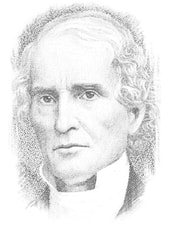 Albert Barnes
Albert Barnes
“To put aside” means to radically and immediately break with these things and in no way allow them to control you again. When Peter appeals to lay these things aside it implies that they occur among the readers of his letter and that they can also occur among us.
“All malice” — All “evil,” the word “malice” we commonly apply now to a particular kind of evil, denoting extreme enmity of heart, ill will, a disposition to injure others without cause, from mere personal gratification, or from a spirit of revenge — Webster. The Greek word, however, includes evil of all kinds (note Romans 1:29; compare Acts 8:22, where it is rendered wickedness, and 1 Corinthians 5:8; 14:20; Ephesians 4:31; Colossians 3:8; Titus 3:3).
“And all guile” — “Deceit of all kinds” (reference Psalm 34:13; 55:1; John 1:47; 2 Corinthians 12:16; 1 Thessalonians 2:3).
“And hypocrisies” — (1 Timothy 4:2, Matthew 23:28; Galatians 2:13) on the word rendered dissimulation. The word means feigning to be what we are not; assuming a false appearance of religion; cloaking a wicked purpose under the appearance of piety. “
And envies” — Hatred of others on account of some excellency which they have, or something which they possess which we do not (Romans 1:29).
“All malice” — All “evil,” the word “malice” we commonly apply now to a particular kind of evil, denoting extreme enmity of heart, ill will, a disposition to injure others without cause, from mere personal gratification, or from a spirit of revenge — Webster. The Greek word, however, includes evil of all kinds (note Romans 1:29; compare Acts 8:22, where it is rendered wickedness, and 1 Corinthians 5:8; 14:20; Ephesians 4:31; Colossians 3:8; Titus 3:3).
“And all guile” — “Deceit of all kinds” (reference Psalm 34:13; 55:1; John 1:47; 2 Corinthians 12:16; 1 Thessalonians 2:3).
“And hypocrisies” — (1 Timothy 4:2, Matthew 23:28; Galatians 2:13) on the word rendered dissimulation. The word means feigning to be what we are not; assuming a false appearance of religion; cloaking a wicked purpose under the appearance of piety. “
And envies” — Hatred of others on account of some excellency which they have, or something which they possess which we do not (Romans 1:29).
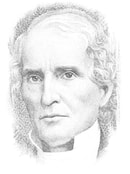 Albert Barnes
Albert Barnes
“But man, even while he disobeys God, does not like to part with Him altogether, but would serve Him enough to soothe his own conscience, or as far as he can without parting with his sin which he loves better.”
― Albert Barnes, Barnes Notes on the Old and New Testaments (On Hosea 2:11)


